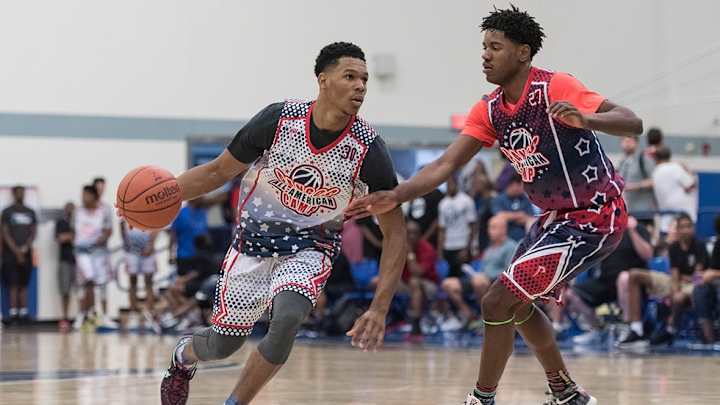API in Dallas lacks NCAA-certified academics. Why did so many highly ranked players enroll there?

Off Love Highway in Dallas, an unremarkable brown four-story office building sits adjacent to a post office and across the street from a Valero gas station. Occupants include a local radio station, a doctor's office and an eyelash extension boutique. On the ground floor, in suite 115, sits the home office of a high school called Advanced Preparatory International. Eight Division I basketball prospects played for API during the 2015–16 season. Three of them rank among the top 15 players nationally in their class, according to Rivals.com. The team, which is sponsored by Under Armour, essentially doubled as the brand's high school all-star team. They finished an erratic season at 34–7, with a final USA Today ranking of No. 24.
On April 21 the NCAA ruled it wouldn't accept courses from API, confirming suspicions that the school was neither advanced nor preparatory. API is appealing the NCAA's ruling, but reports emerged in early June that API's best senior, 6' 7" guard Terrance Ferguson, is considering playing pro hoops overseas next season instead of attending Arizona. While he hasn't commented publicly, his uncertain academic record looms over the decision. "I hope this is a cautionary tale," says Fran Fraschilla, an ESPN analyst who tweeted that Ferguson could end up in Australia. "For him to potentially lose a chance to go to a school like Arizona is tragic."
API filed for incorporation on March 17, 2015, but principal Leicha Shaver and coach Ray Forsett have worked together before. That is the source of the skepticism. Shaver and Forsett came from Prime Prep, the controversial school cofounded by Pro Football Hall of Famer Deion Sanders, which was shut down last year amid a wave of investigations over stolen computers and misappropriated federal funds. Before Prime Prep, Shaver lost her job at Roosevelt High in Dallas, after a school-district investigation found that she had engaged in nepotism and misuse of federal grant money.
What Prime Prep lacked in integrity, it made up for with star players. The most famous, Emmanuel Mudiay, committed to SMU but left for China before his eligibility to play for the Mustangs was determined. Mudiay signed a deal with Under Armour and became a lottery pick for the Nuggets in June 2015. Two other Prime Prep players needed waivers to get eligible to play in college.
• Why top college players are forgoing traditional high schools for superteams
Ferguson and 6' 10" forward Billy Preston transferred to API after Prime Prep closed, linking them to two questionable schools. "I was shocked," says coach Steve Smith of Oak Hill Academy in Mouth of Wilson, Va. "If you are going to send kids to one place, [API] would not be the place." (Preston will play at Oak Hill next season, his fifth high school in four years.)
In September 2015, Trevon Duval, the top point guard in the class of 2017, transferred to API from St. Benedict's in Newark, a traditional national power that has produced NBA players J.R. Smith and Tyler Ennis. Duval's father, Trevor, says that his son's courses in 2015–16 were taken through the University of Nebraska High School, an accredited, university-based online school. St. Benedict's headmaster, Fr. Edwin Leahy, said Duval's transfer is "disgusting, but if you want to live in that world, you have to tolerate some of it." (Trevor says his son left St. Benedict's because his grades slipped: "Academics are very important to this family.")
Duval is still deciding whether to transfer elsewhere for his senior year. "It is a concern," Trevor says of the NCAA ruling on API. "I have to look out for his brand."
A statement provided to SI by Under Armour reads: "It is important to us that the schools we partner with are also committed to properly developing their student athletes in the classroom. If we learn that a school is offering courses not accepted by the NCAA, it would be of serious concern to us and something we would address immediately."
When Shaver was asked for comment she said, "Let me do what I need to do. I have to take care of my kids."
The API case reinforces the notion that attending a school without NCAA-certified academics is a bad strategy. "Why jeopardize your eligibility for nothing?" says Fraschilla. "Maybe a few extra pairs of shoes or a little more hype? It's poor planning and poor decisions by adults."
